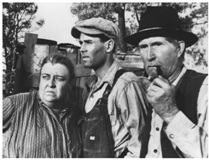|
 |
|
 |
|
|
||
The Grapes of Wrath - Corporate Social
Responsibility
The Grapes of Wrath (1939)
Written by the American, John Steinbeck (1920-68), pictured right below.
Fun facts
Key characters Tom Joad, the book’s hero. Ma Joad, his mother. Jim Casy, his friend. Rose of Sharon, his oldest sister. The story After four years imprisonment for killing a man in a fight, Tom Joad returns to his family farm in Oklahoma, accompanied by an ex-preacher, Jim Casy (pictured right together in the 1940 film - Tom is on the left). They discover the farm deserted and Tom’s family loading its few possessions into an old truck, evicted from their farm and forced to migrate to California like thousands of other desperate farmers (called Okies). Ma Joad, Tom’s mother, is a constant support to everyone else in the family - Tom and his
During the journey Noah leaves (feeling unloved) and Granma dies. Like the other Okies, the family (with Jim Casy) meets much hostility in California, particularly from people who think they will take their jobs, the police and landowners. The Joads arrive in a horrible, overcrowded camp, meeting Floyd Knowles, a union organizer, who tells them that a day's work is so poorly paid that it can't buy a decent meal. Knowles resists arrest by the police for being an agitator, helped by Tom and Jim Casy, who takes the blame for starting the fight and goes to jail. The Joads then move to a government run camp which is much more hospitable and pleasant. But Tom discovers that the police are planning to incite a riot as an excuse to close the camp. He makes sure that this doesn't happen and gets a farm job at even lower wages. But, still without steady work, the Joads have to move on. They find work picking peaches but soon learn they have been hired to break a workers’ strike, provoked by a halving of their wages. Tom runs into Jim who, since his release from jail, has begun to organize the migrant workers into a union. The landowners hate him and so the police hunt him down and kill him. Tom (Henry Fonda, pictured right, in the 1940 film):
He then continues Jim’s work unionizing the migrant workers. During floods, Ma Joad leads her family to the safety of a dry barn. There they find a young boy kneeling over his father who is slowly starving to death. Despite having suffered the misery of a stillborn baby, Rose of Sharon (Tom’s eldest sister) breastfeeds the starving man.
What does it tell us about corporate social responsibility?
1. People must come first In response to the migrants’ exploitation, Jim Casy (John Carradine, pictured right, in the 1940 film) suffers and dies for them, which is why he has the same initials as Jesus Christ. Self-respect is vital. Tom’s retarded brother, Noah, leaves the family because he feels worthless. One farmer, like many others, lost his wealth on losing his farm. “I am the land and the land is me”, he says. The book shows the growing importance of women, ending with Rose of Sharon selflessly giving her breast milk to the starving man. 2. People are interdependent Jim believes that people are joined together into one big soul (Ralph Waldo Emerson’s , pictured right, idea of the “over-soul”). In other words, the interests of each person are the concern of everybody else.
3. Community is crucial The migrants discover they are more effective as a community, operating to achieve common objectives (as when they stop the police closing their camp).
4. Opportunity and oppression The grapes in the book’s title symbolize opportunity, but they are full of wrath because of the migrants’:
Their misery is shown by the starving man at the end of the book. But there is also hope shown by Rose of Sharon breastfeeding him. Rose (Dorris Bowdon) is pictured right in the 1940 film with Ma and Tom .
5. Practise what you preach Jim hates the hypocrisy of self-righteous Christians who mistreat the migrants.
6. Businesses are part of society People and businesses are greatly influenced by changes in the world around them. The Joads are driven from
their farm in Oklahoma by
Poverty and worker exploitation lead to unrest, unions and strikes.
7. Go green The devastating soil erosion in Oklahoma shows what can happen when the environment is neglected.
8. Leadership is vital Jim’s integrity and moral example inspire Tom to carry on his work unionizing the migrants. They are both good leaders because they are pragmatic idealists
9. The triumph of the human spirit Ma Joad (Jane Darwell, pictured right with Tom and her husband, Pa, in the 1940 film)
“People is goin’ on – changin’ a little maybe, but goin’ right on”, she says. Tom inherits her tenacity and optimism, transforming himself from a self-centred criminal into a heroic fighter for migrants’ rights.
10. Profit with principle The book shows that business isn’t necessarily bad, but it can unfairly exploit people.
Key quote on happiness In the souls of the people the grapes of wrath are filling and growing heavy for the vintage.
Key quotes on ethics (by Jim Casy) A man got to do what he got to do. All that lives is holy. I love people so much I’m fit to bust, sometimes. If you think it was a sin – then it’s a sin.
Key quote on banks The bank is something more than men, I tell you. It’s the monster. Men made it, but they can’t control it, the tenant farmers.
Two literature websites to recommend 1. sparknotes.com 2. litcharts.com |
|
|
||
|
|
||
| Copyright © wisdomtowin.com 2025 All Rights Reserved | ||
|


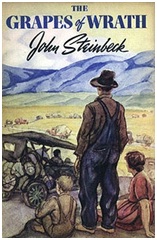
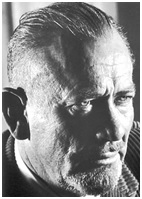

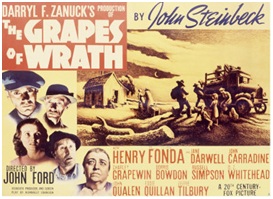
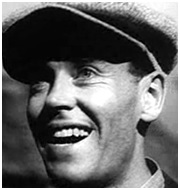
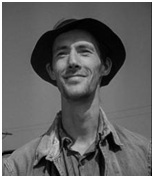
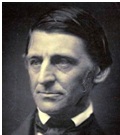
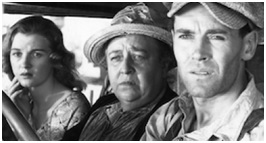
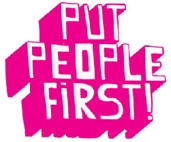 :
: